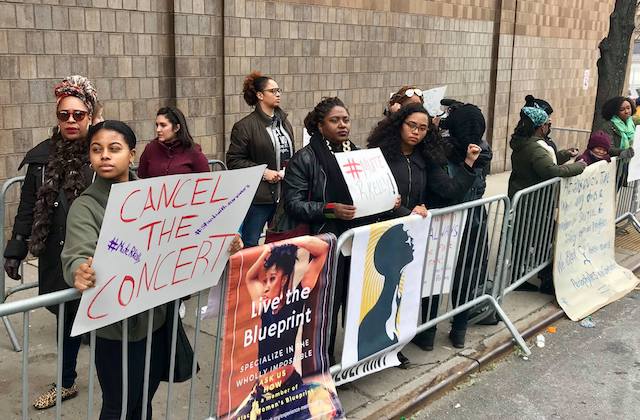#MuteRKelly Co-Founder Discusses Campaign's Success, Backlash

Kenyette Tisha Barnes will not listen to R. Kelly's "I Admit," the 19-minute musical response to critics of his alleged decades of sexual violence toward Black girls and women that he released on Monday (July 23). The activist and lobbyist, who co-created the #MuteRKelly campaign with Oronike Odeleye, implored others to do the same in an interview with Rewire.News yesterday (July 24).
"I won’t give him the satisfaction of trying to entertain me," Barnes explains about the song, whose lyrics reject the accusations of sexual abuse, pedophilia, unlawful imprisionment and child pornography leveled against him. "I see the song as yet another way to silence and dismiss. But, unfortunately for him, that’s not going to work this time. It’s another ploy to take the heat off him."
"I’m encouraging people: Don’t even buy the song," she continues. "Read the damn lyrics if you really want to know who Robert Kelly is. It tells you what you want to know."
Barnes addresses the campaign's genesis, goals and the pushback it incurred throughout the interview. She traces the origin to specific actions she and Odeleye took in Atlanta last year:
When I decided to do this, my original plan was pretty crude. It was to lobby the Fulton County (Georgia) Board of Commissioners. That’s the county that oversees the venue in the Atlanta area, where R. Kelly was supposed to perform in August 2017. If the board wouldn’t stop the show, my plan was to protest the show. At the same time, my #MuteRKelly partner Oronike Odeleye put together a very modest petition to ask Atlanta radio stations not to play the music and for people to not buy the tickets. It was almost a perfect storm. #MuteRKelly, at least the Atlanta movement, was born over coffee and mutual outrage.
She also explains the historic trauma that compels some of Kelly's audience, including his many Black fans, to defend him by belittling the accusers:
The biggest supporters of #MuteRKelly and the organizers are Black women. The biggest supporters of R. Kelly are Black women. It’s a conundrum. But, in my opinion, when we look at the statistics of sexual violence in Black communities, 60 percent of Black girls and women will have been sexually assaulted in some way by the age of 18. That’s almost two thirds of us. When you have that degree of people in a community dealing with this type of trauma, the community has to rationalize it. Then, when you see a movement that’s calling truth to power in terms of sexual violence, it’s almost cognitive dissonance. It’s like, “Wait a minute, why are they making a big deal about this? I’m a survivor and I’m not making a big deal about this.” Well, because you’ve learned from your abuser that it’s your fault. We’ve been taught that sexual violence isn’t that bad, and it’s just part of a being a woman. You learn self-shame, and when you accept that self-shame is the only way to prevent these things from happening to you, it’s easier to say that “if you were more of a lady, this wouldn’t have happened to you.” And I just think we don’t view sexual violence as a big issue, but see it as an extension of the feminist movement. And we think the feminist movement was led by White women, who were also racist and often complicit in false accusations against Black men. This [argument that sexual violence is a White feminist concern] is frequently used as a pivot when Black women prioritize their sexual oppression to the same degree as their racial discrimination.
As for solutions, Barnes argues that municipalities have tremendous power to uplift survivors and reject performers like Kelly:
Local municipalities can create resolutions or ordinances that say they don’t want controversial artists in our communities, especially if people in the community don’t want them there. They can also have discussions about what it means to be female and vulnerable in their communities. We can work with legislatures on issues around sexual violence and sex trafficking. This has never been about censoring his music. It’s about his behavior.
